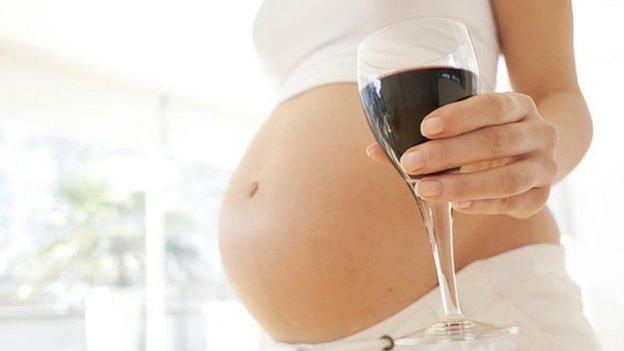Drinking in pregnancy 'significant' cause of childhood brain damage
- Published
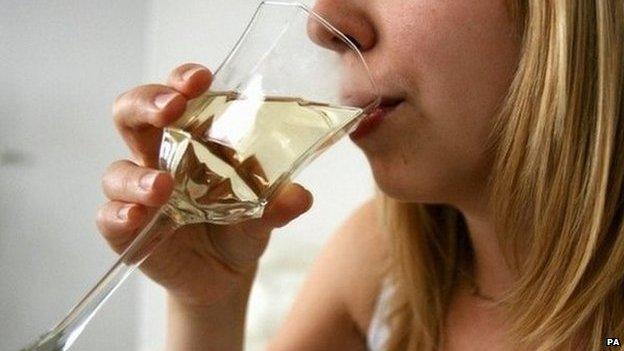
One of the UK's leading experts in child health is calling for stronger warnings on alcohol to alert women to the dangers of drinking while pregnant.
Sir Al Aynsley-Green said exposure to alcohol before birth was one of the "most significant" causes of childhood brain damage.
His call for tougher labelling was backed by delegates at the British Medical Association annual conference.
Sir Al has called for all UK governments to raise public awareness.
Foetal Alcohol Syndrome is a condition affecting children whose mothers drank while pregnant.
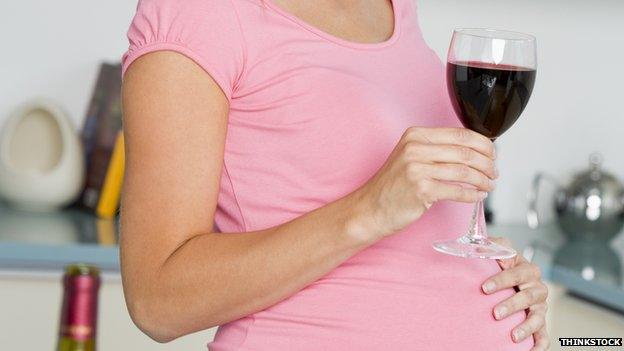
Sir Al is the emeritus professor of child health at University College London, honorary fellow of Oxford University and the first children's commissioner for England.
He said: "Exposure to alcohol before birth is one of the most significant causes of childhood brain damage, learning disability, poor behaviour and even criminality, affecting up to one in every 100 infants."
"It is entirely preventable by not drinking alcohol during pregnancy, but despite this, advice to expectant mothers in the UK and especially England is inconsistent, contradictory and confusing, and services to support diagnosis and management of affected children are inadequate.
"There has, however, been political denial of the scale and importance of the problem."
Scottish Public Health Minister Maureen Watt said the Scottish government was developing a "consistent diagnostic tool" to allow it to accurately record the number of foetal alcohol syndrome cases.
She said the government were monitoring the number of cases and would be able to publish the results in Autumn 2015.
Ms Watt said: "We do not currently have foetal alcohol syndrome teams in any hospital in Scotland."
However, she said they were studying the methods of identifying and treating FAS used in other countries.
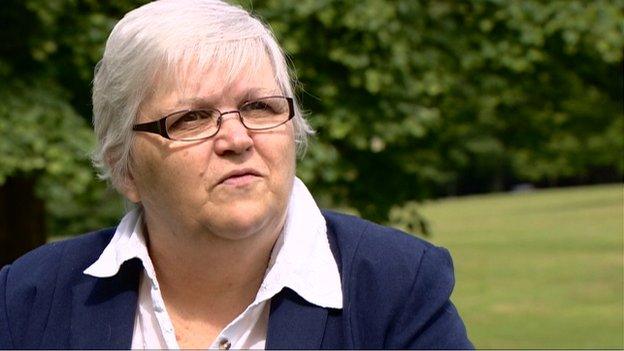
Susannah Mackay said it could affect the relationship between the child and its mother
Susannah Mackay, from Dundee, has an adopted son and foster daughter who have both been diagnosed with disorders related to exposure to alcohol while in the womb. Her son was placed with her when he was seven and her daughter when she was six.
"My daughter has classic Foetal Alcohol Syndrome - not that it was diagnosed when I took her on," she said.
"My son is more impulsive. He has Foetal Alcohol Effects. It took two and a half years from their placement to get a definite diagnosis. They were eventually diagnosed by geneticists who ruled everything else out."
It is not known exactly how many children suffer from Foetal Alcohol Spectrum Disorders (FASD) but the condition is widely under-diagnosed.
Some children will display tell-tale facial features, with a 'pixie' like appearance, but many more will have brain damage which is hidden until they grow older and go to school.

Prof Bill Phillips has specialised in foetal alcohol spectrum disorders for many years
Prof Bill Phillips is an academic and research scientist who has specialised in foetal alcohol spectrum disorders for many years.
"When a baby is born and it looks fine, it doesn't follow that the brain isn't affected," said the emeritus professor at the University of Stirling.
"The face is only affected if there's excessive drinking early in development - during the first three months. The brain goes on developing and drinking can affect the brain at any time."
"It makes the brain less able to regulate its activity, more impulsive, less able to ignore distractions and less able to plan behaviour according to long term goals."
"It affects all aspects of their life," said Mrs Mackay.
"They have very poor impulse control. They never think about consequences. They can't manage time or money. They lack emotional maturity. I might tell them something one day and have to tell them again the next day, and the next day."
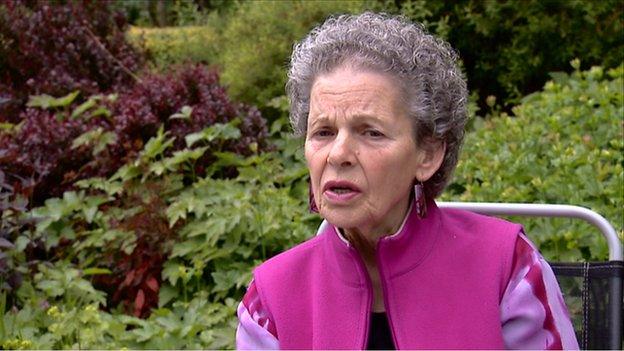
Rena Phillips said foetal alcohol syndrome was a ticking time-bomb
Prof Phillips' wife, Rena, is a social worker, a support group organiser and sits on Children's Panels - legal tribunals which make decisions on the care of vulnerable children in Scotland.
"It's a ticking time-bomb which has kind of exploded," she said.
"Talking to my colleagues, we reckon that the majority of children who come before children's panels have substance misuse in the background. It's in 80% to 90% of cases."
"Unfortunately we've had examples where children have been placed for adoption and the adoptive parents didn't know about the abuse of alcohol during pregnancy.
"Health professionals in health and education don't have enough knowledge about this and they should be told because then they can deal with the consequences."
Drinks manufacturers are encouraged to include "sensible drinking" information for pregnant women on its labels, including warnings to women to "avoid" alcohol if pregnant or trying to conceive.
However such labels are not mandatory.
The Portman Group, which represents the drinks industry, said: "While it is a matter for government to determine safe drinking guidelines, alcohol companies strongly advocate that women should avoid alcohol if pregnant or trying to conceive, which is why the industry has voluntarily labelled over 90% of products on shelves with this advice.
"Calling for legislation in this area is completely unnecessary."
The question of how much alcohol damages the foetus is hotly debated.
Excessive consumption
The Royal College of Obstetricians and Gynaecologists has said "current scientific opinion points to there being no hard evidence that very small amounts of alcohol consumption during pregnancy are harmful".
However, others argue that there is growing scientific evidence that there is no safe limit.
"In contrast to places like Canada, where there is widespread awareness of the risks, and provinces provide comprehensive assessment and prevention support, in England there is little debate or political interest in the effects of drinking during pregnancy, despite a worrying culture of excessive alcohol consumption," said Sir Al.
Prof Phillips agreed.
He said: "If you want a large effect you drink a lot, if you want a little effect you drink a little. If you want no effect you don't drink at all."
Mrs Mackay said that as her children have grown into young adults they have realised that their difficulties could have been avoided.
She said: "It makes it hard to have a relationship with their birth mums, but they both do.
"It's hard to think 'I am the way I am because of what you did'.
"That causes them emotional problems. I don't think they blame their mums because it's a circumstance of their birth, but if they had a choice would they be the way they are? Probably not."
- Published10 February 2015
